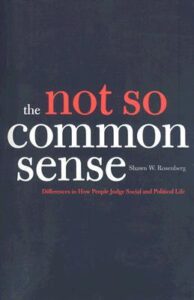
The European Union cannot credibly support democratic change and engagement with civil society abroad while those values suffer at home, notes Carnegie analyst Rosa Balfour.
The end of representative and liberal democracy in Hungary and Poland is a loss for their own citizens but also for the EU’s constitutional principles and the global community of democracies. And the decline of democracy within the EU has made countries more vulnerable to foreign meddling, she writes for the new Carnegie report on Revitalizing Democracy Internationally.
The EU cannot credibly support democratic change and engagement with civil society abroad while those values suffer at home. https://t.co/l8q7nuNfsG
— Democracy Digest (@demdigest) September 9, 2020
The liberal democracy its citizens know, with its abstract principles, complex institutional arrangements and conflicted, deliberative practices, is difficult for most people to understand and embrace, argues Shawn W. Rosenberg, a political psychology specialist at the University of California, Irvine. Since people typically think in terms of simple hierarchies, when it comes to governing, they believe that, like the military, someone must be in charge to make decisions. Constraints on executive power are regarded as unwarranted obstructions, adds Rosenberg, the author of Democracy Devouring Itself: The Rise of the Incompetent Citizen and the Appeal of Populism and The Not So Common Sense: How People Judge Social and Political Events.
 Competitive capitalism, technological innovation, the social dislocations of mass migration and the ever-greater democratization of governance have combined to weaken the authority of traditional elites and the conventional practices they advocate, he writes:
Competitive capitalism, technological innovation, the social dislocations of mass migration and the ever-greater democratization of governance have combined to weaken the authority of traditional elites and the conventional practices they advocate, he writes:
In the process, individuals are now free to come to their own understanding of their situation and needs, and to choose the direction they and others must follow. But… people typically lack the cognitive capacity to generate their own understandings and self-direct. Instead they rely on conventional beliefs and the guidance of authoritative leaders. Rejecting traditional resources but unable to make sense of things themselves, people are increasingly seeking alternative authorities (political, social and religious) to provide the certainties and moral direction they require.
To mark the International Day of Democracy, the Raoul Wallenberg Centre for Human Rights (RWCHR) and Parliamentarians for Global Action (PGA) are organizing a panel discussion on Magnitsky-type sanctions and how legislators can contribute to preventing and fighting impunity for the violation of human rights. The panel will be composed of leading experts and legislators whose work is dedicated to defending democracy and human rights: The Honourable Irwin Cotler – Chair of the RWCHR and former Minister of Justice and Attorney General of Canada; Mr. Bill Browder – CEO of Hermitage Capital Management and Co-Founder of the Justice for Sergei Magnitsky Inter-parliamentary Group; Ms. Margereta Cederfelt – President of the PGA and Rapporteur for the OSCE on the Nemtsov Assassination; Dr. David Donat Cattin – Secretary-General of PGA. Click here to register.
How can Europe’s response to the crisis address the immediate issues and bolster democracy, protect human rights, and foster longer-term peace and stability around the world? On the eve of International Democracy Day, analysts Per Olsson Fridh, Anu Juvonen, Stefano Sannino, and Richard Youngs explore the state of global democracy, European foreign policy, and democracy support amid the pandemic. Rosa Balfour will moderate.
Global Democracy and the Coronavirus Fallout https://t.co/CR3L0ExvT3
— Democracy Digest (@demdigest) September 9, 2020







